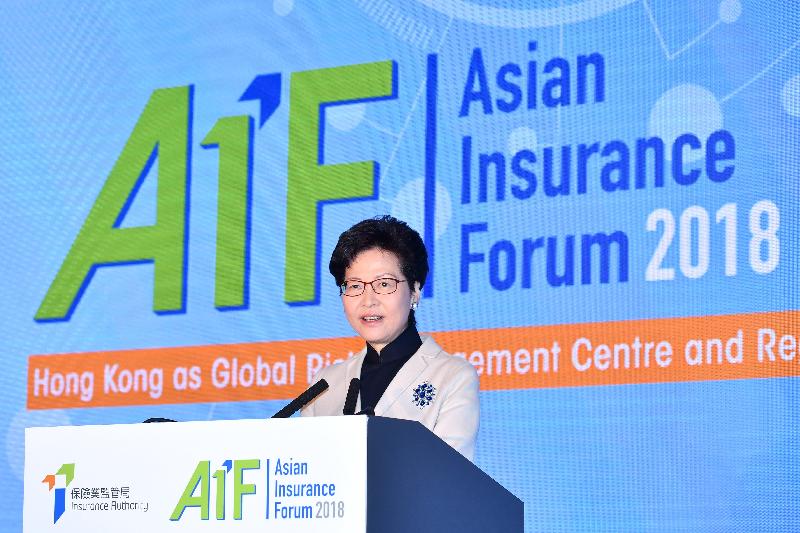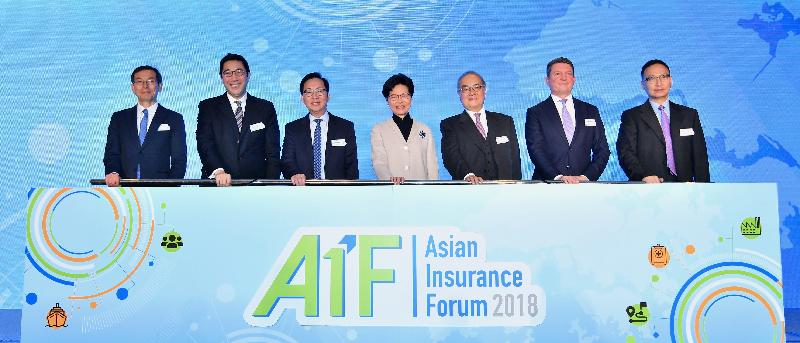Following is the speech by the Chief Executive, Mrs Carrie Lam, at the Asian Insurance Forum 2018 this morning (December 11):
Dr Moses Cheng (Chairman of the Insurance Authority), the Honourable Chan Kin-por (Legislative Council member (Insurance)), Mr Jonathan Dixon (Secretary General of the International Association of Insurance Supervisors), Mr Laurence Li (Chairman of the Financial Services Development Council), distinguished guests, ladies and gentlemen,
Good morning. I am delighted to join you today for the opening of the inaugural Asian Insurance Forum.
The Insurance Authority is a relatively young regulator in Hong Kong, taking over the role from the former Office of the Commissioner of Insurance, a government department staffed by civil servants, in June last year. The purpose of establishing the Insurance Authority is to have a nimble regulator which can address market situations and regulatory changes with higher flexibility and efficiency – a transformation considered necessary as in the case of the regulation of the banking sector, now by the Hong Kong Monetary Authority, and the securities industry, now by the Securities and Futures Commission. Despite its infancy, I commend the Authority for a flying start, acting swiftly on various fronts. These include facilitating the development of insurtech, making good progress in formulating a Risk-based Capital Framework for the insurance sector and preparing for the direct licensing of insurance intermediaries, establishing closer liaison with the Mainland authorities to discuss wider access to the Mainland market for Hong Kong insurance companies, and promoting public understanding of insurance products.
While the Authority has been busy with all its regulatory and market development initiatives, it still goes the extra mile to organise this timely forum for participants to discuss the trends shaping the insurance landscape in the region in general and in Hong Kong in particular. I am delighted to see so many industry leaders taking part in this forum. Your presence demonstrates that the Authority, even at such a young age, is already proving itself to be a high achiever of the industry. I must thank Moses for his leadership and his entire team for their efforts in putting the Authority on such a solid footing.
In less than a month's time, we will be welcoming the new year. And, looking back, 2018 has already secured its place in history as a particularly eventful year. In the financial sector, there were ups and downs in the past 11 months. The Hang Seng Index rose to more than 32 000 points in January, before a recent 20 per cent correction. Despite the market volatility, our financial system has remained robust and resilient.
In September, Super Typhoon Mangkhut hit Hong Kong, causing massive disruption. It was the strongest storm in Hong Kong's recorded history. Fortunately, there was not a single fatality from the storm and only minimal damage to our built infrastructure. Government clean-up teams and many groups of volunteers helped to get the city back on its feet in next to no time. I mention this because it underscores two key attributes – the quality of our physical infrastructure and the resilience of our community.
Quality infrastructure was in the spotlight in the latter part of 2018, as we witnessed the commissioning of two mega infrastructure projects – the Hong Kong-Zhuhai-Macao Bridge and the Guangzhou-Shenzhen-Hong Kong Express Rail Link. These world-class cross-boundary corridors have furthered enhanced Hong Kong's connectivity with the Mainland, facilitating flows of trade, talent and ideas between Hong Kong and its hinterland, particularly the Guangdong-Hong Kong-Macao Greater Bay Area.
The year 2018 has also proven to be a turbulent time on the macroeconomic scale, including growing protectionist sentiments in some countries, geopolitical conflict and severe natural disasters, and more lately trade war between China and the United States and major protests in France. Although Hong Kong has proven its resilience, we cannot afford to be complacent. We cannot and we will not compromise on quality, whether it be the quality of our infrastructure, quality of talent or quality of our systems, including our financial and legal systems.
Despite lingering global economic uncertainties, including trade relations between China and the United States, I am optimistic about Hong Kong's outlook. Third quarter figures show that our unemployment rate remains at a record low of 2.8 per cent, export of goods rose 5 per cent and export of services expanded by 3.1 per cent compared to the same period last year.
Looking ahead, Hong Kong is primed to play a key role in our country's rapid development. As a leading international financial centre, we can anticipate strong demand for our financial services in the Guangdong-Hong Kong-Macao Greater Bay Area, a region covering 11 cities of nearly 70 million people with a collective GDP of about US$1.5 trillion. The fact that Hong Kong serves as a financial launchpad for the Greater Bay Area is evidenced by Hong Kong Fintech Week last month, which, for the first time, featured events in both Hong Kong and Shenzhen. Some 8 000 professionals from more than 50 economies took part in Fintech Week. I anticipate that this cross-boundary model will be adopted by more events in the Greater Bay Area in future.
An integrated Greater Bay Area, fused by quality infrastructure, quality services and quality talent, will in turn stimulate demand for high-quality insurance and risk management services. This forum is a great opportunity for industry players to brainstorm new ways for the insurance industry to contribute to and benefit from the Greater Bay Area.
Looking further afield, we also sit at a critical junction for the Belt and Road Initiative, a converging point for international trade and world-class professional and financial services. Boosting infrastructure development is a priority objective under the Belt and Road Initiative, which covers more than 60 countries across Asia, Africa and Europe. According to an estimate by the Asian Development Bank, as much as US$1.7 trillion per year is needed for infrastructure investment in Asia until 2030. Such infrastructure developments will generate demand for project financing and insurance solutions to manage financial, legal, political and regulatory risks. In this connection, I applaud the Insurance Authority for launching its new Belt and Road Insurance Facilitation Platform. I am confident that the Platform will provide stakeholders with timely and relevant Belt and Road information to help them capture new business opportunities.
The HKSAR Government acts as a "facilitator" and "promoter" to create opportunities for the insurance industry. Last December, we concluded an agreement with the National Development and Reform Commission on Hong Kong's participation in the Belt and Road Initiative. This secures the support of the Central Authorities to encourage Mainland enterprises to establish captive insurance companies in Hong Kong to underwrite risks for their overseas business. The Central Authorities also support Hong Kong to provide professional services such as insurance and re-insurance for large-scale infrastructure projects under the Belt and Road Initiative.
Meanwhile, Hong Kong has already been offering a 50 per cent profits tax concession for professional reinsurance and captive insurance businesses. In my Policy Address in October this year, I further proposed tax relief to help promote the underwriting of specialty risks in Hong Kong.
In addition to tax incentives, we are eager to modernise our legislation to facilitate market development. Again in my 2018 Policy Address, I announced that we will make legislative amendments to allow for the formation of special purpose vehicles in Hong Kong specifically for issuing insurance-linked securities (ILS). According to an international reinsurance company, the global market size for ILS is around US$80 billion. In the first half of 2017, the amount of newly issued ILS exceeded US$8 billion. Hong Kong is well positioned to attract the issuance of ILS by Mainland companies.
We also facilitate and promote growth of marine insurance business in Hong Kong, which is crucial to the development of the maritime and insurance sectors. Hong Kong is a natural marine insurance hub for the region. Indeed, the International Union of Marine Insurance set up its first Asian chapter in Hong Kong in 2016, the first time in the organisation's 142-year history to establish a permanent presence outside of Europe. The opening of the Union's Asian hub in Hong Kong exemplifies its confidence in our city's position as a prominent industry player in Asia.
I have also tasked the Insurance Authority to explore streamlining regulation to facilitate the operation of protection and indemnity clubs for shipowners in Hong Kong. I welcome more ideas from the industry on ways that we can make Hong Kong an attractive hub for high-value-added maritime services, including marine insurance.
I understand the Financial Secretary, Mr Paul Chan, will talk in more detail about some of these topics during the Keynote Luncheon later today. For now, allow me to assure you that my Government is committed to reinforcing Hong Kong's role as a global risk management centre and insurance hub.
I congratulate the Insurance Authority for hosting this Asian Insurance Forum. No doubt, dialogue and networking at this forum will reveal new insights into ways that you and your companies can grasp opportunities in Hong Kong, the Greater Bay Area and throughout the Belt and Road region and beyond.
I wish you all a very fruitful exchange and a rewarding year ahead. Thank you very much.
Follow this news feed: East Asia







